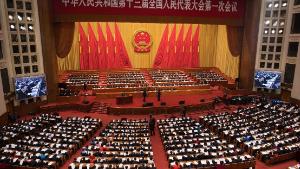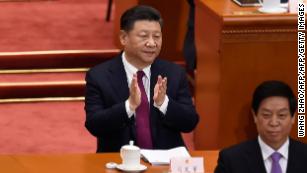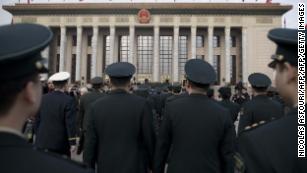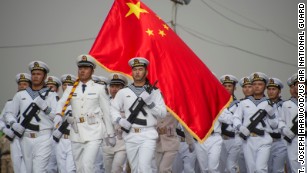Xi Jinping is making sweeping changes to how China is run
(CNN)China's government is about to be massively restructured to fit President Xi Jinping's agenda.
From a powerful new financial regulator to a super ministry to deal with the environment, wide-reaching changes to the way China is governed were passed by the National People's Congress, the country's rubber-stamp parliament, on Saturday.
Experts said the sweeping reforms were some of the largest since the end of the Mao Zedong era in the 1970s.
"Clearly Xi is shoring up his power, but I would suggest what China also wants to do more than anything else is define a mode of government which is not liberal and at the same time ... is predictable, reliable, which is safe for businesses to invest in," Rana Mitter, director of the University China Center at Oxford, told CNN.
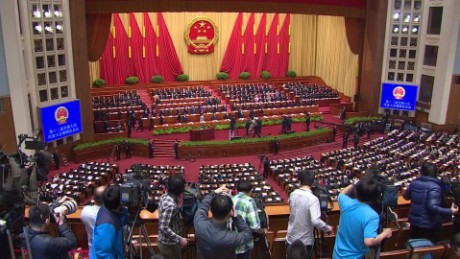
Play Video
National People's Congress: China's view 01:59
It comes just a week after the term limits on the Chinese presidency were removed by the National People's Congress as part of a power grab by Xi which effectively allows him govern for life if he chooses. He was confirmed for a second, five-year term in office on Saturday.
According to state media, under the new plan the number of ministerial-level bodies will be reduced by eight to make the government "better-structured (and) more efficient."
However, Mitter said the entire Chinese power structure has effectively been reshaped around Xi's priorities, including cracking down on corruption, shoring up the economy and environmental protection.
Here are five of the most significant changes and what they mean for China.

China is planning to formalize the rules for its new anti-corruption agency, the National Supervisory Commission or NSC.
It's the latest stage of Xi's ruthless campaign against corruption in China, which forced out multiple high-level party leaders and sent thousands of other officials to jail.
The new commission has long been teased in official media and its powers are expected to extend outside the Communist Party and the military to the rest of the government.
What does it mean?
In a December report examining the framework of the new commission, Amnesty International said it was concerned the body's "far-reaching powers" could significantly infringe on Chinese citizens' human rights.
China clears way for Xi Jinping to rule for life
It is expected to run parallel to China's judiciary,effectively putting it alongside, if not above, courts and prosecutors. A Brookings Institute analysis of the new laws said citizens accused of corruption would have "little or no legal recourse" to challenge the body.
Jiangnan Zhu, associate professor at the University of Hong Kong's politics department, said the new commission would have agencies at national, provincial, prefectural and county levels, giving it countrywide reach.
"It will be the highest state organ of supervision ... It will help solidify the Chinese Communist Party's hold of the Chinese government and discipline a wider array of people who engage in public sectors," she said.

China is creating an environmental protection super ministry to tackle the growing problem of pollution in its fast-growing economy, the government announced Tuesday.
Air pollution killed more than 1.1 million people in China in 2015, the most in the world, according to a study published by the US-based Health Effects Institute.
Replacing the Ministry for Environmental Protection, the Ministry of Ecological Environment will set China's future environmental policies as well as ensuring they are properly enforced.
New evidence from a University of Chicago study found China was making progress in its "war on pollution," improving air quality by as much as 42% in parts of the country.
What does it mean?
Pollution control was one of "three battles" identified by Xi in 2017 as a focus for his second term as China's President, the other two being defusing financial risks and eradicating poverty.
Socialism with Chinese characteristics? Beijing's propaganda explained
Ma Jun, one of China's best known environmentalists, told CNN the new ministry would help to strengthen pollution controls and build a "beautiful China."
"Taking water pollution as an example, the original duties of groundwater, watershed management and agricultural pollution control fall under various ministries and commissions ... resulting in responsibility overlaps and buck-passing," he said.
"After the integration of these responsibilities, the long-term situation of the 'Nine dragons governing the water collectively' will end," he said, using a Chinese saying.

With the reorganization, China's government will also take concrete steps to address the second of Xi's three battles -- growing concerns around financial risk and bad debt endangering the Chinese economy.
In May 2017, China's credit rating was downgraded by Moody's amid concerns over their debt levels, which rose to about 170% of GDP in the previous year. Seven months later, insurance giant Anbang was seized by the government, ostensibly due to concerns over its billion-dollar spending sprees outside China.
A new Banking and Insurance Regulatory Commission will be created by combining two former regulators, while the People's Bank of China -- the country's central bank -- will be given additional regulatory powers.
According to party mouthpiece People's Daily, the changes are designed to supervise China's growing financial industries to avoid "financial risks" and protect consumer rights.
What does it mean?
The Chinese government and Xi himself have placed a huge emphasis on shoring up the country's economy to avoid collapse or recession.
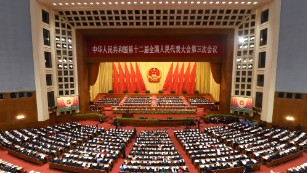
China's NPC focuses on economic growth
Shi Dalong, researcher with Suning Financial Services, said in a report the past supervision of Chinese banks and financial services hadn't been smooth.
But there could be a risks going forward as the new commission and Xi ally Liu He work to tighten regulations, Tan Kong Yam, Economics professor at Singapore's Nanyang Technological University, told CNN.
"(In the past) there have been periods where they tighten credit and it lead to slower growth, so they had to relax somewhat. It's a very fine balance between disciplining the system ... and overliberalizing it," he said.
Tan said there were also likely to be complaints from state-owned enterprises and banks as they found it increasingly difficult to get easy credit and loans to expand.

A new international development cooperation agency will be set up to help coordinate China's aid across the world, according to state broadcaster Xinhua.
It will report directly to the State Council, China's cabinet headed by Premier Li Keqiang. The aim is to enhance China's international credentials as a "major country," according to state media.
Previously China had no dedicated agency devoted to foreign aid, despite giving tens of billions of dollars in overseas assistance since 2000. There is little transparency over how China's aid is spent, however, or how much is investment and loans compared to actual assistance.
What does it mean?
China has an increasingly ambitious foreign policy, including its huge Belt and Road trade and investment program, and is shaking up its foreign ministry as US global influence wanes under President Donald Trump.
'Weaponizing capital': US worries over China's expanding role in Africa
Bob Carr, former Australian foreign minister and director of the Australia-China Relations Institute, told CNN previously Beijing had provided aid in a "heavy-handed manner."
"I think they will shift to a profile in overseas development that will resemble that of OECD countries," he said.
"They've been studying it for some time and I think (the new agency) means aid will be more directly related to the social and economic needs of the state. Fewer big political or vanity projects and fewer examples of a Chinese-built road to a Chinese port to a Chinese mine."

It was the agency that implemented China's infamous one-child policy with an iron fist from its creation in 1981 until government control was relaxed in 2015.
Now the Chinese government has announced the Family Planning Commission will be dismantled as the administration moves away from population control.
News Courtesy: www.cnn.com

